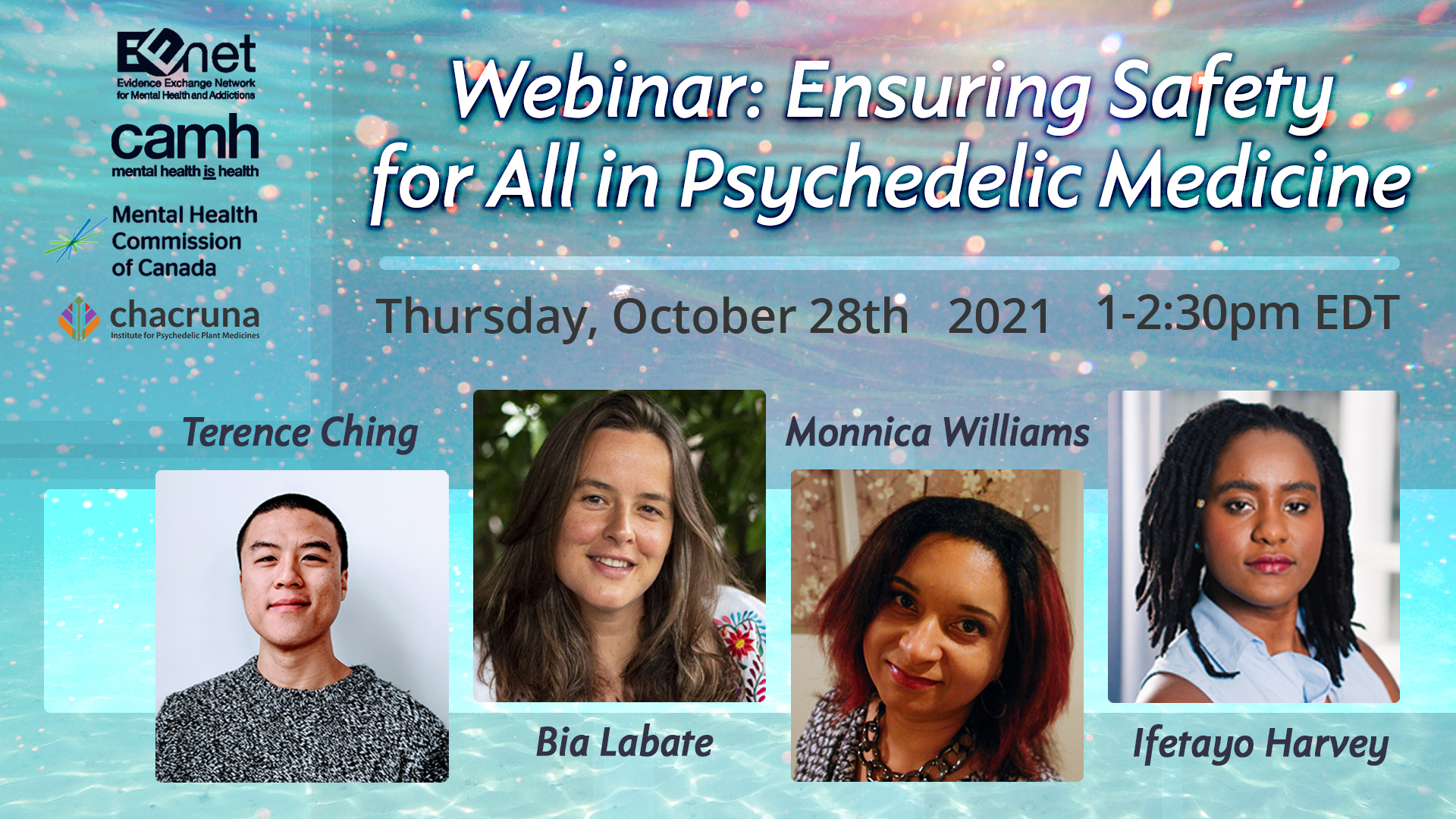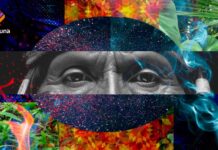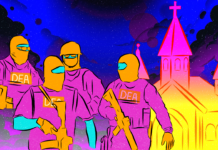- Meet Chacruna at Psychedelic Science 2025 - May 27, 2025
- Psychedelics and Attachment: Fundamentals, Implications, and New Frontiers - May 16, 2025
- Development Outreach Internship (OPEN) - May 6, 2025
Thursday, October 28th from 1-2:30pm EDT
This webinar, hosted by EENet, will feature a conversation among key experts in the psychedelics field, discussing their viewpoints on ensuring psychedelic therapies are safe for everyone who could benefit from them, including issues related to regulation, standards of training, and cultural competence.
This is the second webinar in a series leading up to From Research to Reality, a global summit on psychedelic-assisted therapies and medicine being planned by the Centre for Addiction and Mental Health (CAMH) in collaboration with the Canadian Centre on Substance Use and Addiction (CCSA) and the Mental Health Commission of Canada (MHCC). Learn more about the From Research to Reality summit.
Series objectives
- Enhance understanding of emerging issues in the field of psychedelic substances for the treatment of mental health and substance use disorders.
- Build relationships between stakeholders to assist in moving research into policy and practice.
- Provide inside info on the upcoming 2022 From Research to Reality conference in Toronto
Some topics addressed will include:
1: Why are so many people of color wary of psychedelics? What other factors might explain why BIPOC and queer individuals are underrepresented in psychedelic clinical trials?
2: What are the benefits and risks of psychedelics for racial trauma?
3: What are the benefits and risks of psychedelics for queer people?
4: What dangers can be caused by inexperienced psychedelic therapists or guides?
5: Do you think we should require psychedelic therapists and guides to be regulated?
6: What else should be done to promote safety in psychedelics? What are the most important ethical standards?
“Psychedelic-assisted therapy has huge potential to cure racial trauma, but unfortunately it can also in some cases worsen existing racial trauma. We need to make it safe for everyone.”
Monnica T. Williams, Ph.D., ABPP
“I invite researchers, activists and members of the psychedelic community to join us in this conversation that will help us un-learn and combat racist, sexist, classist, homophobic, xenophobic, and transphobic expressions of oppression. Let’s built an equitable and accessible psychedelic movement.”
Bia Labate, Ph.D
“Creating equitable access to healing for the working poor and people of color is a priority for my organization. I’m thrilled to discuss the possibilities and potentials of psychedelic healing with my esteemed colleagues and uncover workable solutions.”
Ifetayo Harvey
“Amidst the psychedelic therapy boom, it remains important to attune to intersectional lived experiences (e.g., BIPOC, LGBTQ+) that may inform every aspect of the psychedelic therapy process, from recruitment to integration. Join us as we explore possible ways to ensure safe and accessible psychedelic medicine for all!”
Terence H. W. Ching, Ph.D.
Promoted by
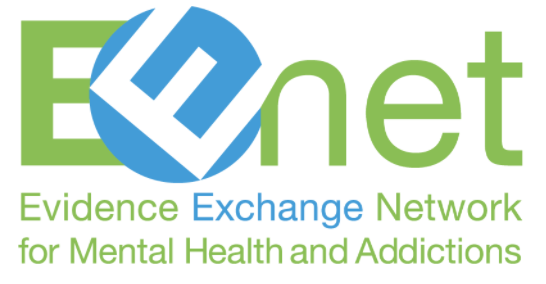
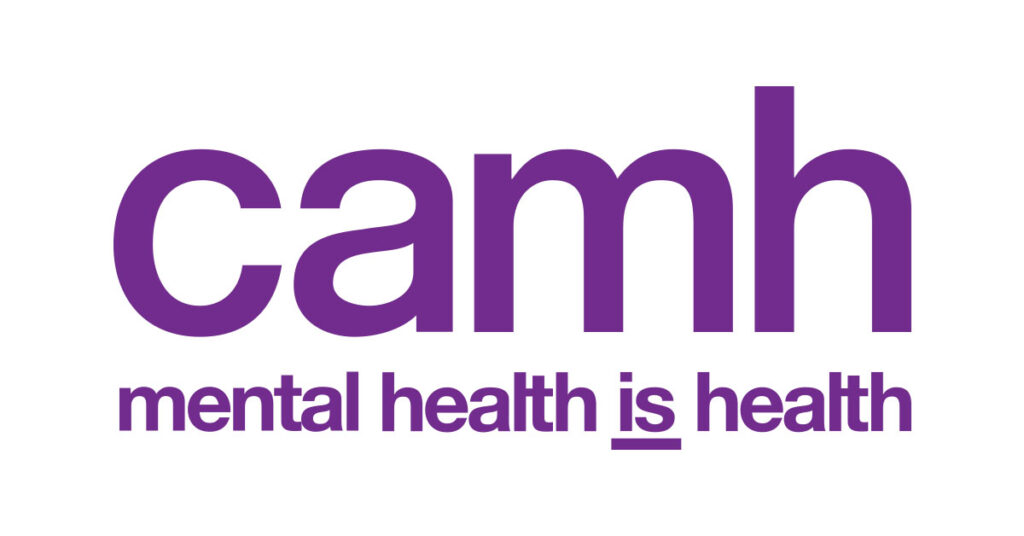
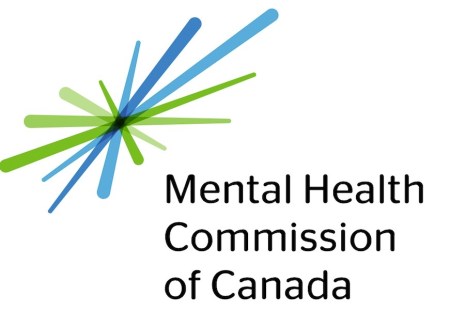
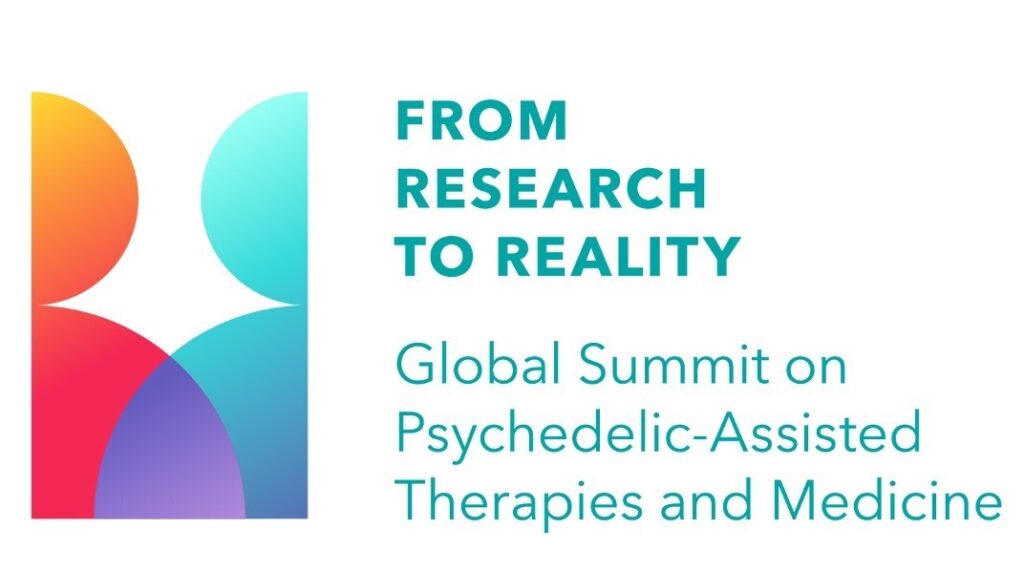
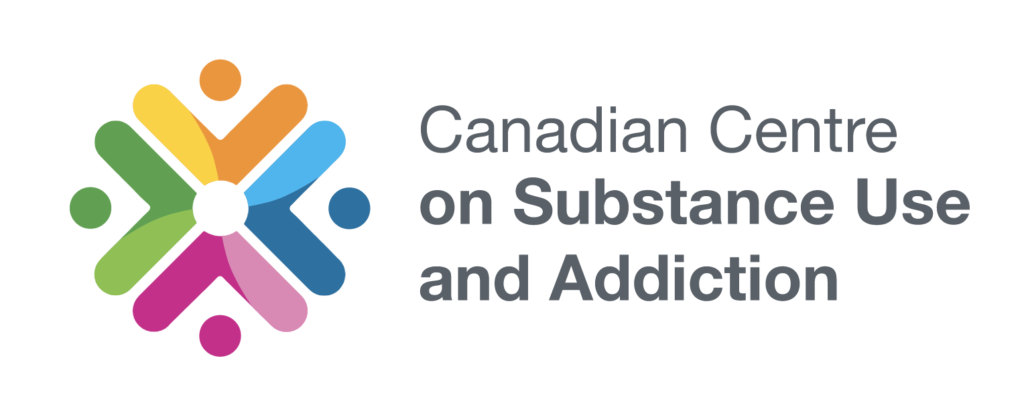
Community Partner
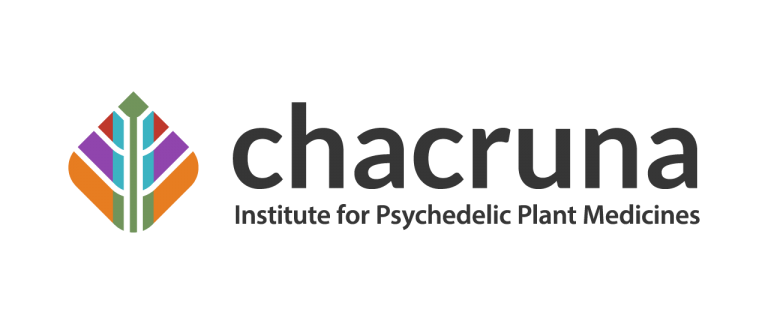
Presenters

Monnica T. Williams is a board-certified licensed clinical psychologist and Associate Professor at the University of Connecticut in the Department of Psychological Sciences and Department of Psychiatry. She is also Clinical Director of the Behavioral Wellness Clinic, where she provides supervision and training to clinicians for empirically-supported treatments. Prior to her move to Connecticut in 2016, Dr. Williams served as the Director of the Center for Mental Health Disparities at the University of Louisville in the Department of Psychological and Brain Sciences. Dr. Williams’ research focuses on African American mental health, culture, and psychopathology, and she has published over 100 scientific articles on these topics. Current projects include the assessment of race-based trauma, unacceptable thoughts in OCD, improving cultural competence in the delivery of mental health care services, and interventions to reduce racism. This includes her work as a PI in a multisite study of MDMA-assisted psychotherapy for PTSD. She also gives diversity trainings nationally for clinical psychology programs, scientific conferences, and community organizations. Dr. Williams is a member of Chacruna’s Racial Equity and Access Committee.

Ifetayo Harvey is the Social Media Manager at Caring Across Generations. Prior to joining Caring Across Generations, Ifetayo worked at the Drug Policy Alliance for five years because of her passion for ending the war on drugs. Ifetayo comes from a family of seven children raised by her mother in Charleston, South Carolina. Ifetayo is the founder and board president of the People of Color Psychedelic Collective. Ifetayo is an outspoken advocate and writer in the drug policy reform space. She has a Bachelor’s degree from Smith College in history and African studies.
www.ifetayo.me

Terence Ching is a US-based Chinese Singaporean who received his Ph.D. in clinical psychology from the University of Connecticut. He is currently a postdoctoral associate at the Yale OCD Research Clinic. Terence has academic and clinical interests in the intersections among OCD and other fear-based disorders, cultural diversity, and psychedelic-assisted psychotherapy (see his published research at:https://www.researchgate.net/profile/Terence_Ching). Terence is currently assisting a randomized clinical trial of psilocybin therapy for OCD, and has also served as a study therapist for an open-label trial of MDMA-assisted psychotherapy for PTSD.
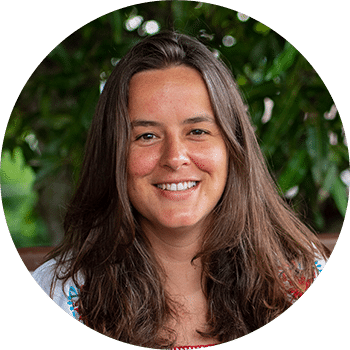
Dr. Beatriz Caiuby Labate (Bia Labate) is a queer Brazilian anthropologist based in San Francisco. She has a Ph.D. in social anthropology from the State University of Campinas (UNICAMP), Brazil. Her main areas of interest are the study of plant medicines, drug policy, shamanism, ritual, religion, and social justice. She is Executive Director of the Chacruna Institute for Psychedelic Plant Medicines (https://chacruna.net, https://chacruna-iri.org, https://chacruna-la.org). She serves as Public Education and Culture Specialist at the Multidisciplinary Association for Psychedelic Studies (MAPS), and Adjunct Faculty at the East-West Psychology Program at the California Institute of Integral Studies (CIIS). She is also Diversity, Culture, and Ethics Advisor at the Synthesis Institute. Additionally, she is a co-founder of the Interdisciplinary Group for Psychoactive Studies (NEIP) in Brazil and editor of its site. She is author, co-author, and co-editor of twenty-four books, two special-edition journals, and several peer-reviewed articles (https://bialabate.net).
Take a minute to browse our stock:
Did you enjoy reading this article?
Please support Chacruna's work by donating to us. We are an independent organization and we offer free education and advocacy for psychedelic plant medicines. We are a team of dedicated volunteers!
Can you help Chacruna advance cultural understanding around these substances?


